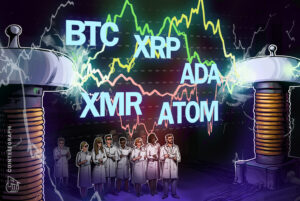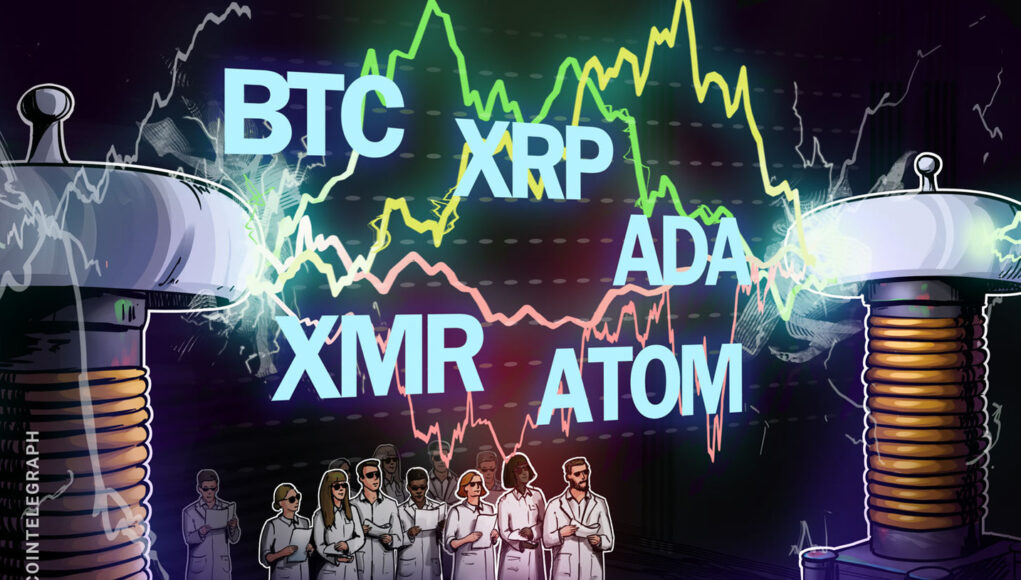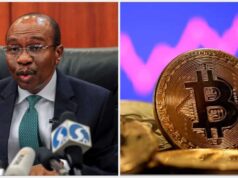 The cryptocurrency space in the month of September 2022, saw it post a bearish performance to end the third quarter of the year. The cryptocurrency market began to rally in anticipation of the Ethereum Merge upgrade, which saw the market rally above the trillion-dollar mark, but it turned out to be a buy the rumor and sell the news price action as the market lost its trillion-dollar status just a few days after claiming it.
The cryptocurrency space in the month of September 2022, saw it post a bearish performance to end the third quarter of the year. The cryptocurrency market began to rally in anticipation of the Ethereum Merge upgrade, which saw the market rally above the trillion-dollar mark, but it turned out to be a buy the rumor and sell the news price action as the market lost its trillion-dollar status just a few days after claiming it.
As previously mentioned, the month ended up being a bearish month for the cryptocurrency space as the flagship cryptocurrency asset, Bitcoin began trading from $20,049.76 at the beginning of the month and ultimately ended the month at $19,431.79, representing a 3.08% loss. In the middle of the month, the price of one bitcoin reached a high of $22,673.82, representing it’s monthly high. Bitcoin’s market dominance ended the month at 39.49%, up by 0.15% from the 39.34% seen at the beginning of the month.
The cryptocurrency market capitalization in the month of September lost 3.12% for the month, from $973.9 billion at the start of the month to end the month at $943.5 billion. The cryptocurrency market capitalization traded as high as $1.08 trillion during the month.
The Altcoin market experienced similar bearishness, losing 3.73% in September, from approximately $591.1 billion to currently standing at $569.1 billion at the end of the month, still trading above the $500 billion mark. During the month of September, we saw the altcoin market capitalization trade as high as $650 billion.
Highlights for the Month of September
Analyzing Bitcoin’s Exchange Inflow Spent Output Ages Bands (SOAB), CryptoQuant contributor Edris showed that those who bought between April 2021 and April 2022 have been selling coins en masse, for less than they bought them. He explained, “These coins have been bought between April 2021 and April 2022 at prices above $30K. This signal means that many holders who have entered the market during the 2021 bull market and above the $30K mark, have recently capitulated and exited the market at an approximate 50% loss.”
- Global criminal police organization Interpol has put out an alert known as a Red Notice in order to help locate and arrest Terraform Labs co-founder Do Kwon, wherever he may be. Terra’s ecosystem fell apart earlier in 2022. Charges were brought against Kwon in South Korea for his involvement in the Terra project. Kwon has tweeted that he is not hiding. He was thought to be in Singapore, although Reuters reporting has indicated a possible change in location. Authorities in South Korea have also taken steps to freeze funds reportedly associated with Kwon.
- The auction to acquire Voyager Digital assets ended in the last week of September when crypto exchange FTX US emerged as the winner, edging out competing bids from CrossTower and Binance. The U.S. exchange paid around $1.4 billion for Voyayer’s assets, which is roughly the same as the lender’s remaining assets. The deal is pending approval from a U.S. bankruptcy court. Wave Financial also participated in the bidding and has since debated the outcome.
- U.S. District Court Judge Analisa Torres ruled that the U.S. Securities and Exchange Commission (SEC) must provide information about comments from a former government official that could impact Ripple’s fight against the securities regulator. In a 2018 speech, former SEC Corporation Finance Division Director William Hinman noted that Bitcoin and Ether did not classify as securities. The ruling from Torres means the SEC must not hold back documents related to that speech. The battle between Ripple and the SEC began in 2020, with the commission calling XRP security.
- After launching its first blockchain fund in 2021, crypto-centric hedge fund Pantera Capital is reportedly looking to raise a whopping $1.25 billion for a second fund targeting digital asset projects. “We want to provide liquidity for people that are kind of giving up because we’re still very bullish for the next 10 or 20 years,” Pantera CEO Dan Morehead told Bloomberg.
- The month, we also saw the completion of the Ethereum Merge upgrade which saw the platform shift from a Proof-of-Work (PoW) consensus mechanism, which is considered to be less environmentally friendly, to a Proof-of-Stake (PoS) which is considered to be more eco-friendly of the two major consensus mechanism. The shift is considered one of the most groundbreaking moves in the cryptocurrency space to date.
With the current bearish trend seen in the market, however, here is a look at 5 cryptocurrencies investors should watch out for in October 2022:
1. Bitcoin’s BTC
Flagship cryptocurrency asset, Bitcoin, is not out of the woods yet as there are still strong indications of more price declines ahead. Asides from the report from CryptoQuant contributor Edris, data from Glassnode suggests that Bitcoin could trade as low as $12,000 soon.
In its new report, titled, “The Great Detox,” Glassnode explains that due to the current price action we are seeing in the market, is pressuring market participants, from long-term holders (LTHs) to miners, which could force a selling pressure that would see a further decline in its price. Because of this, Glassnode predicts Bitcoin’s price could trade as low as $12,000 before we see any meaningful bullish price action.
Although Bitcoin, as shown a remarkable degree of strength in the face of the bullish dollar index (DXY), the measure of the strength of the United States native currency, the U.S. Dollar, as the evaporation in global liquidity, continues, the token still runs the risk of its price falling, like we have seen with other fiat currencies like the British Pounds and the Euro.
Bitcoin’s price has so far remained range-bound this week, trading between a peak of $19,639 and lows of $18,309. However, price action is just barely hanging on to the consolidation range lows set in July, holding the line from what could be further capitulation, a capitulation that could see Bitcoin price trade level it has not traded since October 2020.
Bitcoin ended the month’s trading at $19,431.79.
2. Cardano’s ADA
Cardano is one of the biggest blockchains to successfully use a proof-of-stake consensus mechanism, which is less energy intensive than the proof-of-work algorithm relied upon by Bitcoin. Although the much larger Ethereum has upgraded to PoS, this transition is only going to take place gradually.
After several months of delays, the Cardano Vasil upgrade and hard fork have finally gone live. This happened on the 22nd of September 2022, bringing “significant performance and capability” enhancements to the blockchain. This is the most significant update since adding smart contract functionality last September.
The success of the Cardano mainnet hard fork was announced by blockchain company Input Output Hong Kong (IOHK) on Twitter, while others also observed the hard fork tick over in a live Twitter Spaces with Cardano co-founder Charles Hoskinson.
IOHK previously stated the significant upgrades brought by the fork is block transmission without full validation, allowing for faster block creation. Upgrades to its Plutus smart contracts for increased efficiency also allow decentralized applications to deploy and run at lower costs. Bar-Geffen, the CEO of COTI, a protocol for creating decentralized payment networks and stablecoins, further noted that the hard fork will significantly improve the efficiency of “Djed,” an algorithmic stablecoin developed jointly by IOHK and the COTI Group, increasing the number of transactions carried out on the Djed platform and thus helping position Cardano as a prime contender for stablecoin transactions.
ADA ended the month’s trading at $0.4344.
3. Ethereum’s Ether
In the digital assets space, Ethereum remains the largest smart contract platform, hosting a plethora of financial products, innovation, and automation, with varying degrees of decentralization (generally referred to as DeFi).
The Ethereum Merge has been one of the most groundbreaking and talked about events in the cryptocurrency ecosystem in 2022. It was an event that saw the biggest smart contract platform, the Ethereum Blockchain, move from a Proof-of-Work (PoW) consensus mechanism, which is considered to be less environmentally friendly, to a Proof-of-Stake (PoS) which is considered to be more eco-friendly of the two major consensus mechanism.
One of the main reasons the Ethereum blockchain decided to change its consensus mechanism to the PoS is to reduce the network’s carbon footprint on the world. This is because the Ethereum blockchain requires miners, who have autonomy on what means they use to mine the Ether token, which in turn helps protect the network integrity of the blockchain.
As a result of Ethereum’s network upgrade, the network now requires 99.95% less energy to main its integrity and it leaves Bitcoin, the world’s largest cryptocurrency by market capitalization, to remain the biggest cryptocurrency utilizing the PoW, which requires a significant amount of energy.
Although the Merge has come and gone, the price of Ether continued to suffer towards the end of September, after the event, suggesting a buy the rumor and sell the news trade set up which has seen the price of Ether drop significantly during the month.
Ether ended the month trading at $1,327.98.
4. Solana’s SOL
Solana is also termed an Ethereum competitor, operating on a PoS, similar to Cardano’s blockchain. It is unique because the platform touts to improve its scalability by introducing a proof-of-history (PoH) consensus combined with the underlying proof-of-stake (PoS) consensus of the blockchain.
The average number of daily transactions atop the Solana blockchain plunged by 17.6% in Q2/2022 versus the previous quarter, according to data from Messari. Also, consider, Solana’s revenue dropped 44.4% quarter-on-quarter (also because of recurring network outages). The blockchain made $6.4 million in Q2 2022 from $11.6 million in Q1. According to James Trautman, a researcher at Messari, He explained that “As seen in 2021 and throughout Q1 and Q2, degraded network performance decreases network usage and reduces the network’s continued flow of revenue. If Solana were to continue to experience degraded performance that lasts for a material amount of time, a resulting drag on fundamental usage may catalyze volatility and drag on network value.”
SOL ended the month’s trading at $33.21.
5. XRP
XRP is the native token of the XRP Ledger and can be used as a currency to transact on the platform and other supported platforms.
Ripple is still dealing with the case with the United States Securities and Exchange Commission (SEC). In December of 2020, the SEC charged Ripple with allegations stating that its executives sold $1.3 billion worth of XRP in an unregistered securities offering. Ripple objected to the claims, saying that XRP should not be considered a security.
The case has been on for almost two years, and with recent news, it looks to be drawing towards its conclusion, with Ripple favored as the victor. This is because last week, the SEC and Ripple Labs filed for what is known as a “summary judgment.”
A summary judgment is a legal process where a court decides based on the facts that have been provided without ordering a trial, raising expectations of a final ruling before the year-end. Traders are bidding positive to this news because if Ripple comes out as the victor, it will eliminate a significant source of uncertainty in the XRP market.
According to Dick Lo, the founder and CEO of Hong Kong-based quant trading firm and liquidity provider, TDX Strategies, he explained, “We have seen interest in buying XRP year-end upside call options in anticipation of a resolution in the ongoing lawsuit with the U.S. Securities and Exchange Commission.”
According to defense lawyer James K. Filan, he explained that the results of the summary judgment will be based on provided facts, and a decision on whether XRP is a security or otherwise is expected by mid-December.
On top of this, on the 29th of September 2022, a U.S. District Court Judge ordered the release of documents about a 2018 speech by the then-Director of the SEC’s division of corporation finance, William Hinman, bringing cheer to the XRP community.
In that speech, Himnan said ether, the second-largest cryptocurrency, was not security – a comment Ripple Labs seeks to use as a defense against the SEC’s charge that Ripple violated securities law by raising $1.3 billion through XRP sales to investors between 2013 to 2020. Ripple plans to argue that if the regulator didn’t consider ether as a security back then, how can it subject XRP to securities law?
XRP ended the month’s trading at $0.4798.



















































